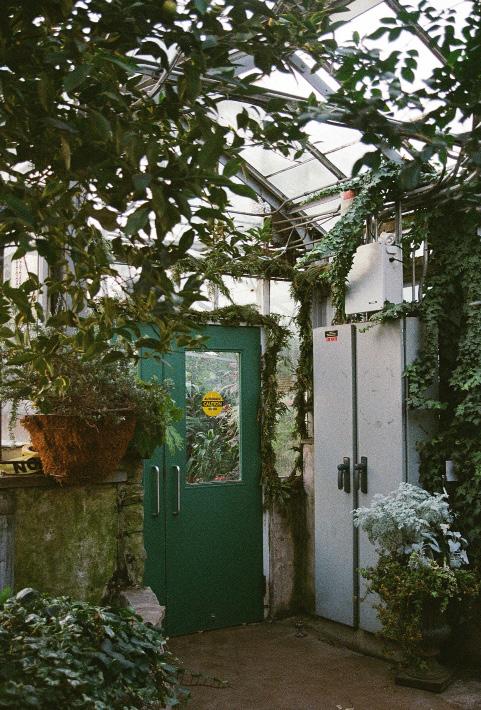
3 minute read
The Bird House
from FALL 2022
Maisie Zanger lived in a bird house. It wasn’t as if she necessarily WANTED to live in a bird house, but through a series of unforeseeable, not all together terrible, but neither quite preferable circumstances, she found herself living in a bird house none the less.
Now, there are many different types of bird houses. There are those little bird houses that are merely decorations, more wind ornaments than true ornithological abodes, and then there are those boxy but charmless things that, while plenty roomy, have about as much attractiveness as a big box store descending upon the outskirts of a national park. But Maisie Zanger’s birdhouse was neither of these unfortunate varieties. She had the good fortune to end up in not only a rather sizable bird house (fortunate, not least of all because despite being some what twiggish in appearance, she was, still, a full sized human woman), but also one that defiantly had class.
Advertisement
If the birds minded their unexpected homo Saipan companion, they at least put up a show of indifference. Indifference, in the case of your common wood sparrow and blue jay is no less noisy than one might expect, but Maisie didn’t mind at all. In fact, she rather enjoyed living in the bird house. At first she had feared that it would get old quickly; but as the days past, she found herself not in the least bit tired of her new dwelling.
There was a slight sense of discomfort however, faint though it was. This discomfort (an “anxiety,” if you were to put so fine a psychological point on it) wasn’t to be counted amongst the garden-variety concerns: boredom, loneliness, lack of sustenance for brain and body. No,
Maisie Zanger was troubled by a more an existential, creeping sort of fear, that by living in a bird house, she would inevitably become a bird.
This fear used to wake her up in the middle of the night, and she would raise her spidery fingers in front of her face, asking herself it they looked any birdi-er than they did yesterday. And her r ever spinning mind would proceed to wonder whether or not it even mattered. “And if I were to change, would I even be able to notice my new found ornithological state of being?” She query herself with her already papery voice growing raspier by the day by general disuse. She had no answer to this question that bothered her, and only the soft rushing hush of the tree branches above her head would eventually lull her back to sleep.
During the day, Maisie would occupy herself by counting. Her birdhouse had an excellent view of the entire neighborhood block, and though it wasn’t really anything too special of a neighborhood block (a bit suburban, a bit rundown, but also a bit nice in its own inexplicable way), there was an entire world of rich happenings if one only took the time to observe.
First she would count rather silly things, like the cracks in the pavement, and the number of cars that went by in a morning. But as the days went on, and descent from the bird house seemed less and less like to Maisie, she started getting more complex in her counting. How many squirrels ran up a tree in the same time it took for the blue sedan to travel from one end of the block to another? (5) How many pebbles could she spot in the span of holding her breath? (24, but the number increased every day) How many children with red hats walked by? (an alarming number of 7 one day, and then a shocking 10 the next, settling down into a nice even lull of 3 the following, before Maisie got bored of that particular observational track). She invented new ones as quickly as she grew bored of them. The one thing that Maisie did not count were the days.
Every so often, the bird seed feeder would be hoisted down, no doubt by the owner of the bird house, refilled, and then hoisted back up on a complex pulley system that Maisie had thought to herself early on in her stay, resembled a sort of dumb waiter that one might find in an old fashioned mansion. This amused her so greatly for at least a couple days, that she couldn’t help but picture herself and the birds who stopped such a mansion, and the owner of the bird mere servant. Even so, Maisie instinctually careful to hide in the shadows when she steps coming to refill the bird seed. bird seed! The most delicious morsels of chewy fruit things and smoother oily thing or others that were all together abdelectable! No wonder Maisie felt like the lady manor house. The rain water that collected in the roof was sweeter than any wine, and the sound of the trees, rustling along the block was to Maisie’s ears, the most delicate of string quartets: an inexplicable melody that she would never grow tired of. Such was Maisie’s satisfaction, that she very quickly forgot why she was in the bird house in the first place. But it didn’t matter. The bird seed came, and the rain sated her thirst, and even after a while, Maisie almost completely stopped worrying about what her indefinite stay in the birdhouse was DOING to her (on a moral/existential/ontological level). After all, it felt silly to worry amidst such luxury.



